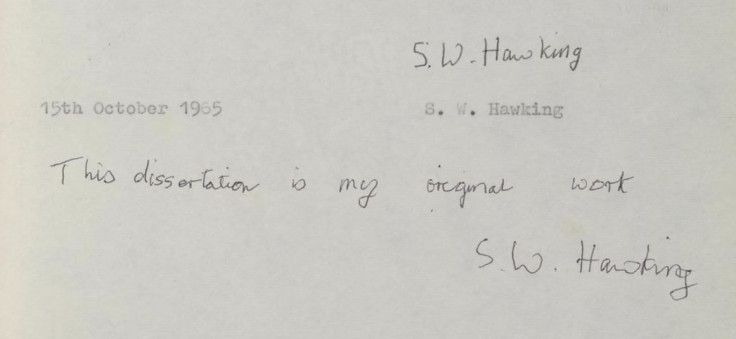Read Stephen Hawking’s 1966 Thesis On The Universe Expanding

Update, 5:39 EST, Oct. 23: After Stephen Hawking’s 1966 thesis on the expanding universe was posted online, there was so much public demand that the University of Cambridge’s online archive crashed from the masses of people trying to open Hawking’s work. The high-resolution scan of the original thesis, however, remained online.
Original story:
Now anyone can read Stephen Hawking’s PhD thesis about the expansion of the universe.
The University of Cambridge has made the work from the famous astrophysicist available online for free, giving people an opportunity to read the thesis from 1966 in which Hawking examines the finer details of a universe that is expanding, as opposed to one that is static.
“By making my PhD thesis open access, I hope to inspire people around the world to look up at the stars and not down at their feet; to wonder about our place in the universe and to try and make sense of the cosmos,” Hawking said in a university statement. “Anyone, anywhere in the world should have free, unhindered access to not just my research, but to the research of every great and enquiring mind across the spectrum of human understanding.”
As a mark of how long ago Hawking was investigating the universe’s expansion, the thesis opens its introduction with the sentence, “The idea that the universe is expanding is of recent origin.”
The typewritten thesis includes Hawking’s handwritten equations as well as notes, such as the one on his acknowledgements page that reads, “This dissertation is my own original work,” and is signed “S.W. Hawking.”
He was 24 years old at the time.
His thesis is also available in a high-resolution scan.
“The 1966 doctoral thesis by the world’s most recognisable scientist is the most requested item in [the university’s open access database] Apollo with the catalogue record alone attracting hundreds of views per month,” according to the Cambridge statement. “In just the past few months, the university has received hundreds of requests from readers wishing to download Professor Hawking’s thesis in full.”
The university called it “historic and compelling research.”
Both Hawking and his institution noted that scientists make advancements based on the discoveries that came before them, which is one reason to make work open-access.
“Each generation stands on the shoulders of those who have gone before them, just as I did as a young PhD student in Cambridge, inspired by the work of Isaac Newton, James Clerk Maxwell and Albert Einstein,” Hawking said. “It’s wonderful to hear how many people have already shown an interest in downloading my thesis — hopefully they won’t be disappointed now that they finally have access to it.”
According to the university, with Hawking’s thesis as a first step toward more open access to academic writings, it hopes to get the work of the dozens of Nobel laureates who have been associated with the school online as well.
“Cambridge University Library has a 600-year-old history we are very proud of. It is home to the physical papers of such greats as Isaac Newton and Charles Darwin,” Cambridge’s library services director Jessica Gardner said, according to the university. “But our responsibility now is today’s researcher and today’s scientists and people working across all disciplines.”

© Copyright IBTimes 2024. All rights reserved.











